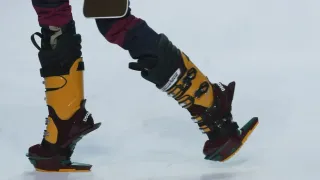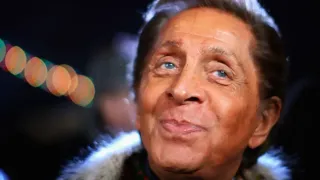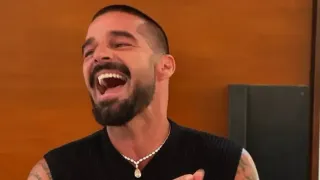July 26, 2021
Todrick Hall: the Multi-Talent on Gay Anthems, Mentors & New Music
Gregg Shapiro READ TIME: 13 MIN.
Is there anything gay performer and Texas-native Todrick Hall can't do? He sings. He dances. He writes songs. He acts on Broadway, in movies, and on TV. He's also an outspoken activist.
On Hall's blockbuster new album Femuline. released in time for Pride 2021, he is joined by all-star collaborators including Chaka Khan, Brandy, Tyra Banks and Ts Madison, and the queer energy and spirit is through the roof. In fact, Hall tears off the roof and turns it into a fabulous costume.
Hall was kind enough to spare me a few minutes to talk about the new album as well as his upcoming concert tour.
Gregg Shapiro: Todrick, in "The Foreplay," Femuline's album opener, you refer to a 'Gay National Anthem,' which I think actually applies to the entire album, described by you as an "open love letter to the LGBTQ community." As an LGBTQ ambassador, what do you think of the rapid strides the community has made in recent years?
Todrick Hall: It makes me feel optimistic about where the world is going. I feel like we're nowhere near where we need to be. As a queer person in 2021, I don't think I can list you a single song where a man is singing to another man using a pronoun that would typically be used to describe a man.
In 2021, when we have all the technology in the world, and we can fly people to outer space, and do insane things with science, and we can do incredible things with the technology that we have, the fact that we have not yet advanced to the place where men can sing to other men on the radio without it being a subliminal thing or is kind of sugar-coated and not addressed head-on, is a sad thing.
I'm grateful for the strides that we've made, but we're nowhere near where we need to be in normalizing being a part of the LGBTQ community. That is my goal with every project that I do; to introduce my music and my message, not just to people who are from my community, but to the allies and people who are heterosexual fans and followers that happened to tumble across my videos on YouTube.
Keep fighting the good fight! Femuline was released in June 2021. In addition to being Pride month, it was also the time when Juneteenth was established as a federal holiday. Can you please say something about the significance of these two events happening concurrently?
I think that is so important that that exists. I had a close friend who didn't know what Juneteenth was. It was somebody who I would consider to be typically "woke" and aware of everything that's happening. But I think a lot of times, even people who are part of the Black community have celebrated Juneteenth for so long but didn't really know what its origin was.
A lot of people who celebrate Pride month never knew why Pride existed. They don't know anything about Stonewall or anything that has happened in the gay community. I think right now what social media is doing, because a lot of those things are not necessarily taught in every school, in every book, especially gay history –I don't know that gay history even exists in public school districts– what's so incredible about social media and the platforms that people have to receive information is that some people are educating themselves on things that they would not normally be introduced to because their school districts are too conservative to give them that information.
I'm happy that both of those things are being presented in a way that is easily digestible to people who might not get that information in other places. This is the first year that I realized that Pride month and Juneteenth were in the same month. I grew up celebrating Juneteenth every year of my life.
I wasn't an open member of the gay community at that point. It's a beautiful month for me because the two things I'm most proud of, which has been difficult to become proud to be Black and proud to be not just a member of the gay community, but a gay activist. It's been incredible to be able to come into my own and embrace the two things about me that people have used to criticize me and put me down my entire life.
The divas came out to play with you on "Femuline," beginning with the goddess Chaka Khan, who can be heard on the song "Fabulosity." Please tell the readers how your collaboration with Chaka came to be.
Chaka Khan and I did "The Color Purple" on Broadway in 2007 or 2008. She didn't actually remember that I was in the ensemble because she was only in it for such a brief amount of time. But I've always had such a huge love for her from being able to watch her from the wings to get to hear her in a way that most people wouldn't be able to.
When you hear someone sing eight shows a week on a Broadway stage, it lets you have a huge amount of respect for their instrument and their gift. Undeniably, it was like a gift when she walked into the room to sing "Fabulosity." She needed no warm-ups. She just said, "Press record and let's go," [laughs]. It was incredible to watch. It was like one of those moments in my life where I was like, "This is iconic!"
To be able to soak up her energy and listen to her stories from being a legend and working with people that to me are like figments of my imagination. To talk to someone who knew Prince or knew Luther Vandross or was friends with Whitney Houston was a remarkable thing that a lot of people don't get to experience. That was eye-opening and life-changing for me and one of those Bucket List things, a milestone in my career that I'll never forget.
Talk about fabulosity! Brandy is another grand diva with whom you teamed up on the song "Click Clack." What was it like working with her?
Brandy and I have been friends for a while. It's really cool to work with Chaka Khan, but to be in the presence of Brandy is otherworldly to me. She was the first black Princess that I saw and one of the first times I realized how beautiful a black woman could be. I had seen many beautiful black women around me growing up.
But to watch all of the characters and of all the ethnicities be obsessed with how gorgeous she was when she walked into the ball (in the 1997 television movie version of "Cinderella"); I didn't realize how impactful that would be for me. Not just at that moment, being a kid in fifth or sixth grade, but throughout my entire life. To get to work with her is game-changing.
That movie is what planted the seed in me that made me want to be a Broadway performer and pursue dancing and singing. In a lot of ways, Brandy has been an icon to me my whole life. She's now a mentor to me and, in some weird way, she is my fairy godmother the way Whitney Houston was her fairy godmother in that movie, and in real life.
In so many chapters in my life, I've gone through things that celebrities or public figures go through that you can't really get advice from your close friends, because it's something that are unimaginable experiences and heartaches and back-stabbings that I've gone through.
Brandy has been somebody who, if you look through her career, she has gone through such tragic things so many times and she's come through victorious, and still her voice shines. She's been able to give me some lifelong advice that has helped me. She's not just somebody that I collaborate with, she's somebody I consider to be a very good close friend.
None other than Tyra Banks joins you on the song "Fashion." Please say something about the role that fashion and style plays in your life.
It's everything to me. When I grew up, I used to try to fit into the status quo and wear the things that young Black boys were supposed to wear in Texas at that time. It took me a while. I've made some questionable fashion choices.
My mom called me at one point and asked, "Why do you have to wear waffles and ice cream on your head?" I think it was a form of expression for me to scream out and stick out from the crowd. Wearing t-shirts and jeans – no offense to all the people who follow the Simon Cowell look of fashion – but that wasn't something that ever spoke to me. I always wanted to wear things that were one of a kind and you wouldn't even know where to where to get it from.
I love when I see Beyoncé wearing something and I'm like, "Where would they even make that?" Or Lady Gaga wearing clothes that look like they're art pieces. Or drag queens like Aquaria, who have been some of the most boundary-pushing drag queens, from the way she does her make-up to her hair to the jewelry and clothes that she wears.
It's been incredible to be inspired by so many different things. Being a part of the drag community, the fashion even extends further than it does for the real fashion world. You can do anything, and there are no rules and no amount of campiness that goes too far.
Fashion plays a huge part in me building my brand. I love when I can take something like a Solo cup and make a dress out of it. Make it such an iconic part of that era of music for me that my fans go home and do DIY projects, trying to figure out how they can self-construct a similar dress [laughs] out of Solo cups. It's just so much fun and it allows me to express myself in ways I've never been able to before. I love that it's constantly evolving. I just live for fashion! I was so grateful that Tyra Banks found the time to squeeze me into what I'm sure was her crazy schedule.
The versatility inherent in the album's title comes through loud and clear on the song "Both." How important do you think it is to be versatile and flexible in life and in love?
I think that it was something that was so scary for me. Even if you're a proud number of the LGBTQ community, there are so many rules even within that community that've already been so shunned and judged and put into boxes, that we as a community oftentimes put ourselves in.
Oftentimes somebody who blurs with the feminine side, at least publicly, gets shunned and becomes less desirable to other men that are in the gay community. That was a part of being in the community that I was super insecure about.
In my relationships, I never wanted the guys that I was dating to see me having heels or wigs around. I know a couple of guys who told me when people come over for dates they hide their heels. It was such a sad part of our community. I think writing an anthem that made people feel comfortable and confident about that aspect of being gay was something that was really important. I wrote that song and it is actually my favorite song. I think it's such a powerful song.
There aren't many songs you can write where you can say, "There's no other song like this." As far as I know, there are no other songs that tackle that topic. I'm grateful that people have gravitated towards that song in the way they have.
The song "Dick This Big" features Ts Madison, and the aptly named "Berserk" uses the terms of endearment "sis" and "bitch," which were also utilized to great effect in a scene in the movie "Zola," in which Ts Madison appears. Have you seen the movie, and what did you think of her performance?
I have not seen that movie, but I have experienced Ts Madison on so many levels, so I can only imagine how incredible she would be in that movie. She is a superstar and has been doing so many things to break down barriers and boundaries. Things that, at the time, could have seemed like a grotesque statement, but looking back at it now in 2021, you look at the things that she's done and she's always been trailblazing and standing up for people who are in that category that people didn't understand.
She's been somebody who's been unapologetically herself for so long. She's given so many people the confidence to walk in her footsteps. I just think she's incredible. She's such a badass.
That term gets thrown and stamped onto people who I don't feel possess that badass energy. But Ts Madison is the definition of what it means to be badass after living her truth, even if everybody doesn't understand it. I just love that! I'm so grateful that she was willing to join me and the cast of characters [laughs] on this album.
To have a trans woman of color on the album is revolutionary. For her to sing on that song, specifically, is boundary- pushing. I sent her a few that she could have joined to be on, and that was the one she chose. I'm so here for the fact that I got to work with her. I hope this is the first of many times because I love her energy.
That definitely comes through! "Rainin' Fellas," your homage to "It's Raining Men," made me wonder if you ever had the chance to meet Martha Wash, one of the original Weather Girls.
I have not been able to meet Martha Wash, but I think that she's incredible.
By extension, because of Martha's association with Sylvester, how much of an influence would you say that Sylvester has had on you?
There have been so many projects that have come up where people have compared me to Sylvester. A couple of years ago, I went down this rabbit hole and I started watching interviews with Sylvester's parents and his closest friends. I saw how groundbreaking he was. The fact that he took his head voice, which a lot of people don't have or shy away from.
There are few acts that have become known and synonymous for singing in their head voice, but it was similar to the way that Prince sang. It crossed the boundaries of masculinity and femininity, which I think is what this entire movement is about.
And the clothes that Sylvester wore! I think he was so fabulous! I wish that I could go back in time and have met him. I hope that someday I'm able to work on a project or something that is a tribute to him. I think that even though I didn't directly watch his work as a child, I definitely knew "You Make Me Feel (Mighty Real)." I think he was one of the most trailblazing people. I don't know any other LGBTQ+ people who have been able to break into mainstream radio.
I think Sylvester is the only person that I know that has been able to successfully do that because of his talent and his gift. I'm a huge fan of Sylvester. I wish that more people knew about how legendary he was, and how difficult it was for him to do what he did at the time that he did.
We're speaking shortly before you're going to begin this big concert tour.
I am doing something that I've never done before. I'm a proud person about the type of inclusivity that I have on my tour. I looked back on it this year and, as I say I'm learning and growing with every single project that I do, and I realized that I didn't have enough trans representation. I think that I could do bigger and better and more.
I really wanted to encompass the whole Femuline era. I want you to watch the show and not be able to tell if someone is a male or female or even care because it's an irrelevant point. I want you to see incredible, talented people bringing this show and this music to life. I want it to be full of fashion and epic costumes. I want it to be a celebration. It's going to be fun, no matter what. It always feels like a huge celebration or Pride or something at my concerts.
But this time, more than ever, I want people to feel like they can come out of their house, dressed however they want, wearing whatever they want, and know that this is going to be the one night for some of these people out of the entire year that they wouldn't be judged by anybody. In fact, they're going to be celebrated for the fact that they're so different. That's what this tour is about. I'm going to make sure that the fans know that when they come there, but that they also see that when they watch the show.
Help keep the Bay Area Reporter going in these tough times. To support local, independent, LGBTQ journalism, consider becoming a BAR member.






